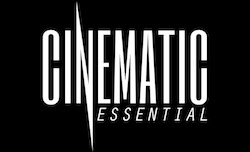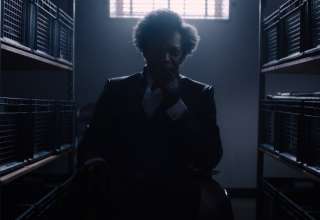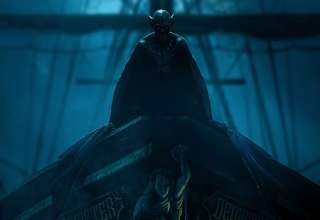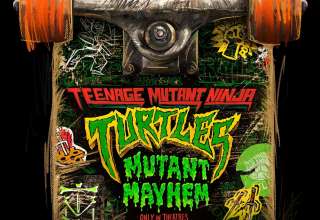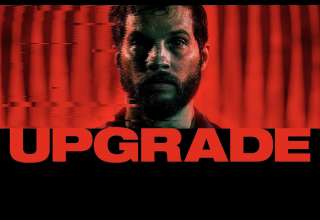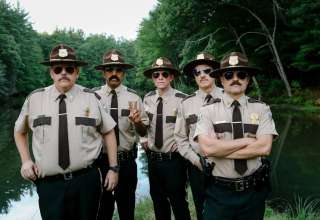I had the pleasure of meeting up with Ben Wheatley to talk about Free Fire, the latest film in his growing library as a filmmaker. While we did speak about that, we also managed to hit on a few other topics concerning film during this interview. Not only did I learn a little about his background and his working relationship with his wife Amy, I had a chance to find out about the types of films that he likes, what he’s hoping in the future and much more.
Cinematic Essential: I know Free Fire was filmed in the UK, but the location is supposed to be Boston. Why is that?
Ben Wheatley: The film never says it’s Boston. It’s somewhere in Massachusetts, but it’s never made specific and that’s on purpose. But history brought me to the town. The IRA raising money and buying guns to bring back to Ireland. So that was it really. We were really conscious of not making a movie in another country with actors not from Boston doing Boston accents and taking it to Boston and getting f*cking killed. And we knew there had been films made in Boston with Boston people where people complain about the accents. We knew we would be screwed, so I wanted to make it as vague as possible in that respect.
Have you taken that approach before?
All of our movies have been like that. High Rise was like that where there’s no specific date or location even though it’s based in London. We don’t say specifically where it is, because we don’t want to end up in a sideshow having to explain or get caught up in the specifics of doing something wrong because it’s not important to what the film is.
How much of this film was improvised?
I tend to do a take which is on the script and a take which is paraphrased around the script and then backward and forward. Wild improvisation never works. It looks great and it feels really real, but when you cut it you can’t do anything with it. But paraphrasing where they can drop in little phrases and everybody’s a bit on their toes and you never know what’s going to happen makes for an alive, real feeling. And also thinking back into the actual script, instead of doing take after take after take of the script until everyone’s tired and they’re bored, which is what really happens, they don’t get better and better. They get worse the more takes you do. If you’re flopping back and forth with these paraphrased versions of the performances then they learn stuff from their own improvisation and they feed back into the straight reading of their lines.
You wrote the script with your wife (Amy Jump). How does that dynamic work with that and even editing?
The writing is not how you would imagine. It’s not like a writing room or we’re finishing each others sentences or anything like that. It’s more like I write three or four drafts of the first version of the film and then she’ll come on and rewrite that. We don’t need to talk to each other about what we’re doing in that respect. And then on this film, she then rewrote everyday on set a day ahead looking at the improvisation bits that had been done to make sure they can be used properly, so stuff shifted or a character shifted as we found it as we’re shooting onset and she would readjust the script as we went along. The editing is a bit more shouty. In there it’s quite intense and a lot of arguing, but once you leave the editing suite and go outside it’s fine.
Looking at your history, you’ve done different types of film. Is that on purpose?
Yeah, because I like lots of different types of film and lots of these films are from spec scripts as well. So I’ll sit down and go, “I’d like to write a sci-fi movie. Okay, I’ll write one.” And then see if anyone will make it. That’s the great thing about not going with ideas to get development money. If you’re happy to work for free, you can knock out as many scripts as you’d like from all different genres. Then you see what people are interested in making.
How many scripts have you written so far?
I don’t know. Last year, we wrote about six different scripts, but they’re all at different levels of development. Some have been very “bare-bones” and some have been nearing completion.
Do you have any desire to make films outside of the UK?
Yeah, I mean there’s American money in something like Free Fire. It’s weird when we film. I always thought films were made in Hollywood. They got studios there and make movies in Hollywood, but they don’t. The studios and the financing and stuff’s there, but the studios make movies in Canada and they make movies in London. Star Wars is all pretty much shot in London. It’s almost like the whole thing that happened with Nike. It’s all been outsourced all over the world. So, you can be a filmmaker and not live in America. And you see lots of people do that and kind of bounce around. It’s become more of a global industry in that respect. But I think I’ll certainly shoot things in the States eventually. It’s just expensive, you know? It’s a lot more expensive to shoot here than it is to shoot anywhere.
You’re seen as a cult director.
That’s kind of disastrous though.
What do you mean?
Well, cult films are films that have kind of failed and then picked up by critics and loved later after the audience didn’t love them. That’s bad! The goal is not to be a cult director.
So you hope to make more mainstream films?
Yeah. I always thought I was making mainstream movies. It’s just the audience that tells you whether they are or not. You see plenty of things that are mainstream which are massively weird, but it’s whether it hits with the audience and they’re interested in a thing at a certain time or whether you’ve just got that touch where you can get a larger audience. There’s no proper commercial style or proper uncommercial style. You know, when you watch some of the really big movies like the big franchises, they’re as f*cking crazy as an art film half the time or they make not a lick of sense which doesn’t seem to bother anybody. Then you’ve got the other end which is very “nuts and bolts,” very straight ahead and easy to understand. Then you’ve got other things where they’re weird but people like them and they get a following.
Do you think Free Fire has a chance to follow down that path?
Who knows. I have no control over it sadly. Otherwise, I’d be talking to you from my helicopter high above on the way to my learjet. I think of all the films I’ve made it’s much more friendly to the audience and fun. And I’ve sat through loads of screenings. Certainly the screenings at South by Southwest, the one in Toronto (Toronto International Film Festival) was really cool, and I was at Music Box (Theater) in Chicago the other day and it was great. You could hear everyone laughing and having a good time. That’s encouraging. Whether that will translate into world domination, I don’t know.
You’ve received a mostly positive response so far in your career and this one following up with that.
Yeah, yeah. People really like this one (Free Fire). There’s nothing better than playing a midnight screening and everyone going f*cking nuts. It won the audience award in Toronto for Midnight (Madness). It doesn’t get any better than that, because it’s the audience that votes.
It’s received a pretty good reaction here in Boston as well.
Yeah, a few people I talked to today were happy we didn’t murder the accent which is good.
Here, that’s very important.
Yeah, it’s very important. I could see that. From a distance, I know that’s important.
I read that you were an animator at one point.
Yeah, it’s a bit cruel to animators. I animated stuff because it was easier than making films. If you stood me next to an actual animator it would be an embarrassing situation.
Do you see yourself ever attempting to make animated films?
Well, I’d like to. There’s already a lot of people who are really good at that, so I might just stick to what I’m doing. Yeah, I’d love to do that or claymation or any of those things. It’s a very specific way of working animation. You can see in the way that Pixar does their stuff. The fine honing of gags over years and years. I’ve been chatting to some of the story editors over there and it’s like three or four years of remaking and making those movies before they release them and that’s why they’re so f*cking good, you know? They’re like hardened coal that’s being turned into a diamond from intense pressure.
What kind of movies do you like to watch for your own enjoyment?
Well, I watch whatever I can get my hands on. So, I’ll watch art films and I’ll watch the stuff that’s in the multiplex. And I’m always happy when I see something I like, but it’s a lot of sifting.
Anything specific that you really liked recently?
I never have a decent answer which sounds really rude. Oh, I saw Deepwater Horizon on the plane and I really enjoyed it. It’s very natural and I didn’t expect that at all. I thought it would be really bombastic and heavy. But I kind of like the Peter Berg movies. I think graphically they’re really exciting. I even liked Battleship.
I thought his last one was good. It wasn’t that well received in Boston.
Patriots Day.
Yeah, Patriots Day. I read you liked The Lone Ranger as well?
Yeah, yeah.
Was that where you saw Armie Hammer and decided you wanted to try to work with him?
Yeah, that’s what it was. We saw Lone Ranger and thought it was really good. A lot of the time these films that get a real – because I really enjoyed John Carter and I really enjoyed Speed Racer as well. It’s almost like whenever you hear critics raining down on something you’re like, “Oh, that might be quite good.” And yeah, I can’t understand why there was a negative thing about The Lone Ranger. It was bizarre to me after (Gore) Verbinski made Rango, which is essentially the same film, and makes another one with real people in it is that suddenly a problem? Who knows.
Your next film, Freakshift will also star Armie Hammer. Clearly, there’s a connection between the two of you.
It’s because he looks so similar to me! He’s like my mirror. I look at him and I go, “Yeah.” What I like about Armie is that he’s very charming and he reminds me of old Hollywood. He reminds me of Robert Redford or something like that in the 60s. He has that vibe to him. He’s kind of rangy and even though he’s really good-looking, he’s kind of gimpy and weird and funny. But I also like the idea of having someone who kind of looks like a 50s actor and putting him into really terrible situations and dragging him through the mud. In Freakshift, it’s kind of like that again. He should be the lead of it, but his position is flipped upside down. It’s taking the expectation of how a film should be constructed and changing it.
Are you willing to talk about what Freakshift is about in detail?
It’s like a sci-fi monster movie with cops who have to defend a city at night that gets attacked by monsters and it happens every night. They come up through the ground and they’re more like pest control shooting all these creatures. But they can never get anyone to do the pest control thing, so basically if you get jailed or anything they give you an option of like you can do three weeks on the Freakshift or you can do four years in county or whatever it is. And people will be like, “Oh, f*ck” and they take the three weeks and they all get horribly killed by these things. And they arrest a lot of people at night since there’s a strict curfew and it’s some kind of self-fulfilling thing. And it’s this woman who’s basically having an affair who came back late, her family got killed and then she got arrested. So it’s one night of her tracking down the one creature who killed her family. But also dealing with the guy she had an affair with who then joined the Freakshift so there’s this tension. I hesitate to say this, but it’s like a rom-com monster movie thing going on. It’s like Hill Street Blues meets Doom the video game. That’s what I’m hoping for.
The thing I like about filmmakers like you is that you do have that unique style where you’re willing to do different things. I just hope you keep doing that.
If I’m allowed to. I just want to work again! It’s like, “One more film, please?” You know, before they send me off to film prison.
